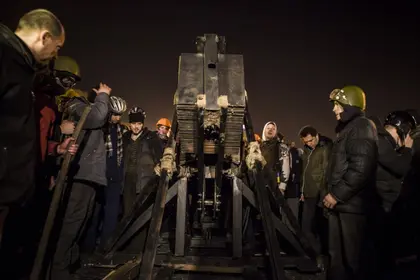President Viktor Yanukovych received an ultimatum from militant protesters on EuroMaidan: Resign now or else.
Hostility to a deal reached between Yanukovych and opposition flared on Independence Square the night of Feb. 21. Anti-government protesters say the deal does not go far enough because it allows Yanukovych to stay in power until an early election in December, rather than resign immediately.
When opposition leaders spoke to protesters from the main stage about the deal, a member of one of the “people’s self-defense” units interrupted and took to the stage with this threat:
“77 people died, and they are still negotiating. I ask you to support us in this. I speak from my unit – if you (opposition leaders) don’t make a statement demanding Yanukovych’s resignation by 10 a.m. tomorrow, we will go with the weapons, I swear it.”
The man, who goes by the nickname Bandera (after legendary Ukrainian nationalist Stepan Bandera who lived from 1909 to 1959), could not be immediately reached.
(Editor’s Note: The man who became famous for his warning is Volodymyr Parasiuk, currently a member of parliament. The video can be seen here)
A protester threatens to take up arms if President Viktor Yanukovych doesn’t resign immediately.
Vitali Klitschko, leader of the Ukrainian Democratic Alliance for Reform, attempted to calm the crowd down. He said the demands need to be realistic. But the crowd, still incensed by the slayings of 77 people this week, booed Klitschko.
Oleh Yavorsky, a member of Maidan’s self-defense, and private entrepreneur, supported the fellow protester’s call.
“We were waiting for Yanukovych to resign for three months and after he killed 77 people no delays can be accepted,” Yavorsky said. “I support the idea to storm him with weapons, we are not afraid of anything now, we are ready to die.”

There was no immediate response from the Yanukovych administration to this threat.
In a deal midwifed on Fec. 20-21 by the foreign ministers of France, Germany and Poland, Yanukovych agreed for early elections “no later than December,” adoption of a 2004 constitution that weakens presidential powers and a new coalition government to be appointed in the next 10 days.
But the deal does not have support from many groups leading the three-month-old protesters. The sentiment among critics is that the political opposition squandered a position of strength. International outrage against Yanukovych quickly mounted after the deaths, prompting the European Union and United States to apply financial and visa sanctions against top Ukrainian officials. Moreover, Yanukovych is losing support with the defections of lawmakers from his own party as well as police officers.
“We have to state the obvious fact that the criminal regime has not yet realized either the gravity of its evil doings, not wrath of the people,” according to a statement by the militant Right Sector, which has been on the front lines of clashes with police.
Dmytro Yarosh, the Right Sector leader, also demands the arrest of Interior Minister Vitaliy Zakharchenko, rather than merely his resignation. He also wants commanders of Berkut riot-control police arrested as well as removal of the head of the Security Service of Ukraine, the general prosecutor and defense minister. Yarosh also demanded investigations into the violence against protesters.
“We are inclined to see this statement of Yanukovych as another attempt at window dressing. The people’s revolution continue and it will end with full removal from power … and the people’s occupation of it,” Yarosh said.

Parliament, which voted on Feb. 21 to return to the 2004 Constitution that curbs presidential powers and strengthens parliamentary ones, also voted to free opposition leader Yulia Tyomoshenko from prison and remove Zakharchenko from office.
At least member of the 450-seat parliament also doesn’t think the deal goes far enough to punish Yanukovych and has introduced legislation to impeach him.
The Right Sector also said that the murdered protesters should be awarded Hero of Ukraine status, and their families should get pensions for life from the state.
You can also highlight the text and press Ctrl + Enter



